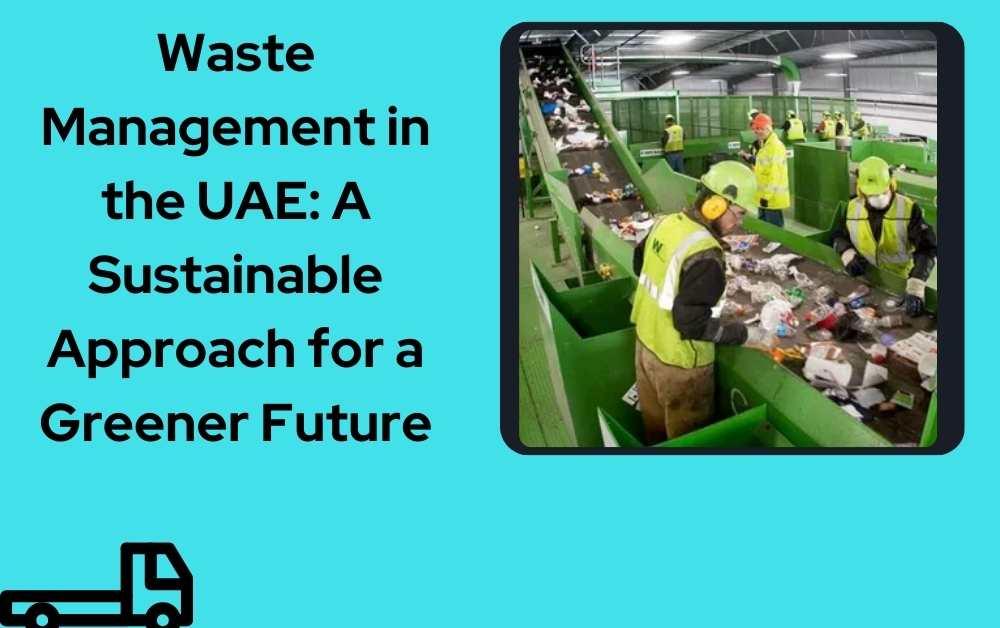Waste management is a crucial aspect of any modern society, and the United Arab Emirates (UAE) is no exception. With its rapid economic growth and urbanization over the past few decades, the UAE has faced the challenge of managing its increasing waste streams effectively. In this blog post, we will explore the state of waste management in UAE, the challenges it faces, and the sustainable approaches being adopted to create a greener and cleaner environment for its residents.

The Current Waste Scenario
1. Urbanization and Waste Generation
As the UAE has transformed into a hub of business and tourism, its urban population has surged, leading to a substantial increase in waste generation. The urban lifestyle, characterized by consumption and convenience, has resulted in a higher volume of waste being produced daily. This poses a significant challenge for waste management authorities in the country.
2. Composition of Waste
Understanding the composition of waste is essential for effective waste management. In the UAE, like many other developed countries, the waste generated consists of various components, including:
- Organic Waste: Food scraps, yard waste, and other biodegradable materials.
- Paper and Cardboard: Used newspapers, packaging materials, and cardboard boxes.
- Plastics: Packaging materials, bottles, and disposable items.
- Metals: Aluminum cans and other metallic waste.
- Glass: Broken glass bottles and containers.
- Hazardous Waste: Chemicals, batteries, and electronic waste (e-waste).
The composition of waste varies from region to region within the UAE, and understanding this diversity is crucial for developing effective waste management strategies.
Challenges in Waste Management
1. Limited Landfill Space
One of the major challenges facing waste management in the UAE is the limited availability of landfill space. With the rapid pace of urban development, land is at a premium, making it increasingly difficult to find suitable areas for landfill sites. This scarcity of space emphasizes the need for alternative waste disposal methods.
2. Rapid Population Growth
The UAE’s population has been growing at a rapid rate, driven by immigration and high birth rates. This demographic growth places additional pressure on waste management infrastructure, as more people produce more waste.
3. Recycling and Public Awareness
Recycling rates in the UAE have historically been low, primarily due to a lack of public awareness and recycling infrastructure. Many residents are not fully aware of the importance of recycling and its environmental benefits. Promoting recycling practices is essential for sustainable waste management.
Sustainable Approaches to Waste Management
1. Waste-to-Energy Facilities
To address the limited landfill space and reduce the environmental impact of waste disposal, the UAE has invested in waste-to-energy facilities. These plants incinerate non-recyclable waste and convert it into energy, which can then be used to generate electricity. This approach not only reduces landfill usage but also contributes to the country’s energy needs.
2. Recycling Initiatives
Recognizing the importance of recycling, the UAE government has initiated various programs to promote recycling among its residents. Recycling bins are becoming more common in urban areas, making it easier for people to separate recyclables from non-recyclables. Efforts are also underway to educate the public about the benefits of recycling and the proper way to dispose of different types of waste.
3. Waste Segregation at Source
One effective method to improve recycling rates is waste segregation at the source. This means that households and businesses separate their waste into different categories, such as organic, paper, plastic, and metal, before disposal. Waste segregation makes recycling more efficient and reduces the contamination of recyclable materials.
4. Sustainable Landfill Management
While landfill space is limited, proper landfill management practices are still essential. The UAE is working on implementing sustainable landfill management techniques to minimize the environmental impact of waste disposal. This includes measures like lining landfills to prevent soil and groundwater contamination and capturing landfill gas for energy generation.
5. Circular Economy Initiatives
A circular economy approach aims to reduce waste generation by reusing and recycling products and materials. The UAE is increasingly embracing this concept by promoting the reuse of products, encouraging the manufacturing of items from recycled materials, and reducing single-use plastic products.
Public Participation and Awareness
Creating a sustainable waste management system requires active participation from the public. Here are some ways in which residents and businesses can contribute:
1. Proper Disposal
Dispose of waste in designated bins and containers, following the waste segregation guidelines provided by local authorities.
2. Reduce, Reuse, Recycle
Adopt the “3 R’s” mantra: Reduce consumption, reuse items whenever possible, and recycle materials that can be recycled.
3. Educate and Advocate
Educate yourself and others about the importance of responsible waste management and advocate for sustainable practices in your community.
Also read :- Waste Management in the UAE: Keeping Our Environment Clean and Sustainable
Conclusion
Waste management in the UAE is a complex and evolving challenge. With its rapidly growing population and urbanization, finding sustainable solutions for waste disposal is of utmost importance. The UAE government and various organizations are actively working towards a greener and cleaner future by investing in waste-to-energy facilities, promoting recycling, and encouraging public participation. It is essential for residents and businesses to play their part in this effort by adopting responsible waste management practices. By working together, the UAE can continue its journey towards a more sustainable and environmentally friendly waste management system, ensuring a cleaner and greener future for all.

